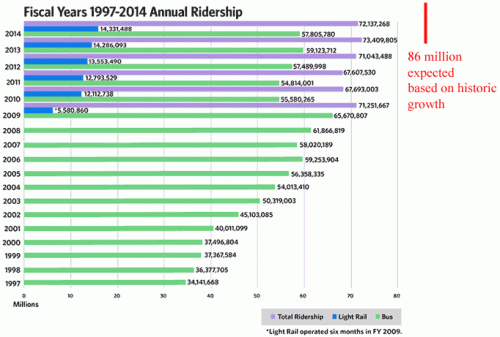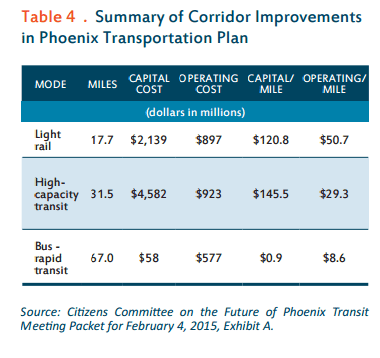Vote "NO!" on Phoenix Prop 104 Transit Tax
Randal O'Toole and the Arizona Free Enterprise Club have weighed in with a comprehensive report on Phoenix's Prop 104 transit tax, and the results are ugly. A few findings:
- The oft-repeated claim that light rail has generated $7 Billion dollars in economic development is simply untrue. In fact, many of the projects included in this claim have never been built (like the Sycamore Station development) or involve projects that have nothing to do with light rail (such as the $600 million Convention Center Expansion, which was funded largely by state tax dollars).
- The main beneficiaries of the transit plan appear to be contractors and developers who have projects near rail stations. The tax revenue from the plan combined with the generous subsidies offered to select developments ensures that this plan will benefit a few contractors and developers at the expense of others.
- The plan is unbalanced and ignores vehicle street improvements. Despite the fact that only 3% of the population uses transit (less than 1% use light rail), 95% of the funding in the plan goes toward expanded bus and rail service. Only 3% goes toward vehicle street improvements.
- Transit ridership actually fell after the light rail opened. From when light rail opened in 2009 through 2014, any gains in light rail ridership were offset by the loss of more than one bus rider. Ridership is still 1.2 million less per year than it was in 2009.
- The transit plan as proposed will increase traffic congestion, energy usage and greenhouse gas emissions. In fact, the transit plan will use more
The complete report is here.
Coyoteblog readers will be totally familiar with this statement from the report about light rail merely cannibalizing bus riders, echoing past articles I have had saying the same thing:
According to the city of Phoenix and Valley Metro, light rail is a great success in Phoenix, generating a 42-percent increase in transit ridership since 2001 and stimulating the construction of $7 billion in new real estate development along its route. A close look, however, reveals that both of these claims are wrong.
The increase in ridership took place between 2001 and 2009, the (fiscal) year that the light-rail line opened. Since that year, for every light-rail rider gained, the region’s transit systems lost more than one bus rider. Per capita transit ridership has declined by 8 percent since 2009 partly because the high cost of light rail forced a 34-percent increase in average bus fares by 2010 and an 18-percent decrease in bus service by 2013.
You can see this perfectly well from a chart right off of our transit authority's web site (except for my annotation in red), which I discussed in depth here.
It is just incredibly disingenuous that light rail supporters are trying to claim credit for transit ridership increases that occurred before the line was built and whose growth the line essentially halted.
Another claim the report demolishes is that light rail is somehow spurring development. Supporters claim $7 billion of light rail development planned or built along the line, but oddly enough that is the exact same figure they were touting almost 8 years ago before the line was even completed. Doesn't seem like they are getting much traction, huh? In fact, the list actually shortens with every year as projects get cancelled and no new ones are added. But beyond this, simply adding up development along the line and claiming that it is all incremental to the line's construction is simply moronic, the same facile BS analysis often used to support publicly funded football stadiums. The obvious questions are:
- How do they know this development is incremental, and not development that would have occurred anyway? In particular, this line was built through the three of the largest pre-existing development hubs in the metropolitan area (North Central Ave, Downtown Phoenix, and Tempe/ASU). There was always development activity in these areas, and always going to be
- Much of the new activity they cite is near Tempe Town Lake, and I would give that project, not the rail, much of the credit. The city did a marvelous job (see, I can give props to government once in a while) converting a big wide ugly dry ditch into a lake that is the centerpiece for business and condo development
- Much of this development is subsidized by various government programs. It is impossible to separate the effects of the subsidy from the rail line.
Finally, if you don't believe me about the relative costs of the two modes, let's take a look at the number from Phoenix's own plan. They speak for themselves:
So what does one get for the 5x higher operating costs and 134x higher capital costs of light rail over buses? Well on the negative side, one gets a system that is substantially less flexible and responsive to changes. The only positive I can come up with is that middle and upper class white people consider buses low class and want a transportation mode of their own.

